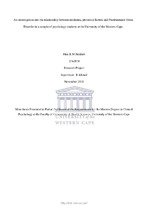An investigation into the relationship between resilience, protective factors and Posttraumatic Stress Disorder in a sample of psychology students at the University of the Western Cape
Abstract
Due to the recent findings that the majority of South African’s have been exposed to high
levels of trauma, the effects of trauma on mental health and wellbeing have become an important
area of research in the South African context. Although many individuals in our country experience
high exposure and multiple incidences of trauma, there are a significant number of people who seem
to cope well in the face of adverse circumstances and trauma and do not develop stress
symptomology as a result of exposure to a traumatic event. These individuals are viewed as resilient
as they are able to utilize protective factors at their disposal, aiding them in preventing the
development of symptoms associated with Posttraumatic Stress Disorder (PTSD). A large body of
literature exists that identifies various protective factors, which may have a positive influence on an
individual’s response to a traumatic event, thus making them more resilient. However, there is a gap
in the South African research on the relationship between exposure to trauma, protective factors and
the development of PTSD. The aim of this study is to explain how protective factors mediate PTSD
symptoms. It investigates protective factors that resilient individuals utilize in the face of trauma
such as; internal characteristics or traits, various demographic factors (i.e., age, gender), supportive
interpersonal relationships, religious affiliation and community and family factors that have been
identified as protective factors in the literature. Resilience emerged as significant in that it mitigated
the development of posttraumatic symptoms (PTS) amongst the sample of university students. This
indicates that despite the high incidences of exposure to trauma, individuals have the ability to be
resilient, which therefore serves as a protective factor in the event of trauma.
The present study constitutes a secondary analysis of previously collected survey data. The
data being analysed is from a quantitative, cross-sectional survey that adopted a non-random,
convenience sampling method. Logistic regression was undertaken in order to determine the
relationship between age, religious affiliation, type of exposure, resilience and posttraumatic stress
exposure. Only resilience emerges as a significant predictor underlying its importance for mediating
traumatic outcomes. It highlights the importance od including protective factors in future research
and interventions.

